




SPRING / SUMMER 2023 Number 75
BOARD OF DIRECTORS
Jim Felton, President
Burt Bassler, Treasurer
Giselle Jurkanin, VP & Secretary
Keith Alley
Steve Balling
John Gallagher
Garrett Girvan
Liz Harvey Roberts
Claudia Hein
Scott Hein
Margaret Kruse
Shirley Langlois
Bob Marx
Doug Matthew
Phil O’Loane
Robert Phelps
Malcolm Sproul
Jeff Stone
Achilleus Tiu
STAFF
Ted Clement, Executive Director
Seth Adams, Land Conservation Director
Sean Burke, Land Programs Director
Karen Ferriere, Development Director
Monica Oei, Finance & Administration Director
Tuesday Bentley, Accounting & Administrative Associate
Hidemi Crosse, Senior Accountant
Venanzio Favalora and Alyxa Ray, Caretakers
Juan Pablo Galván Martínez, Senior Land Use Manager
Shannon Grover, Sr. Development Associate & Event Manager
Dana Halpin, Administrative Assistant
Franchesca Hendryx, Education & Outreach Associate
Brit Hutchinson, Event Coordinator
Samantha Kading, Assistant Development Director
Laura Kindsvater, Senior Communications Manager
Queenie Li, Database Coordinator
Katie Lopez, Staff Accountant & Office Administrator
Roxana Lucero, Land Stewardship Manager
Joanne McCluhan, Executive Assistant
Haley Sutton , Land Stewardship
Associate

Dear Supporters,
Thanks to you and the rest of our Save Mount Diablo team, we achieved numerous conservation successes in 2022, and we continue that momentum in 2023. Together, we realized many successes in 2022, such as:
• Raised funds to acquire a conservation easement permanently protecting almost 154 acres of Concord Mt. Diablo Trail Ride Association land on the slopes of Mount Diablo within the Missing Mile. This area contains much privately owned open space that has not yet been conserved.
• Negotiated with the CEMEX corporation over six years, resulting in them announcing they will donate a 101-acre parcel they own, containing part of the Black Point Trail, to Mount Diablo State Park.
• Helped East Bay Regional Park District secure an option agreement to protect the strategic 768-acre Finley Road Ranch so it will become an important new staging area for existing and future trails.
• Secured an option agreement to acquire the 6.69-acre Krane Pond property within the Missing Mile next to Mount Diablo State Park.
• Won two lawsuits against Seeno/Discovery Builders and Pittsburg over the proposed Faria development project.
• Furthered our Diablo Range expansion work, developing new partners and advancing efforts to protect important lands like Tesla Park and Del Puerto Canyon.
• Opened our Mangini Ranch Educational Preserve to the public, with over four miles of trails built with the help of volunteers like the Trail Dogs and students.
• Advanced our 10,000 Trees and Plants project by planting and protecting more than 2,000 trees and plants.
• Set all-time high fundraising records with our mid-year appeal, Moonlight on the Mountain, and year-end appeal.
continued on next page •

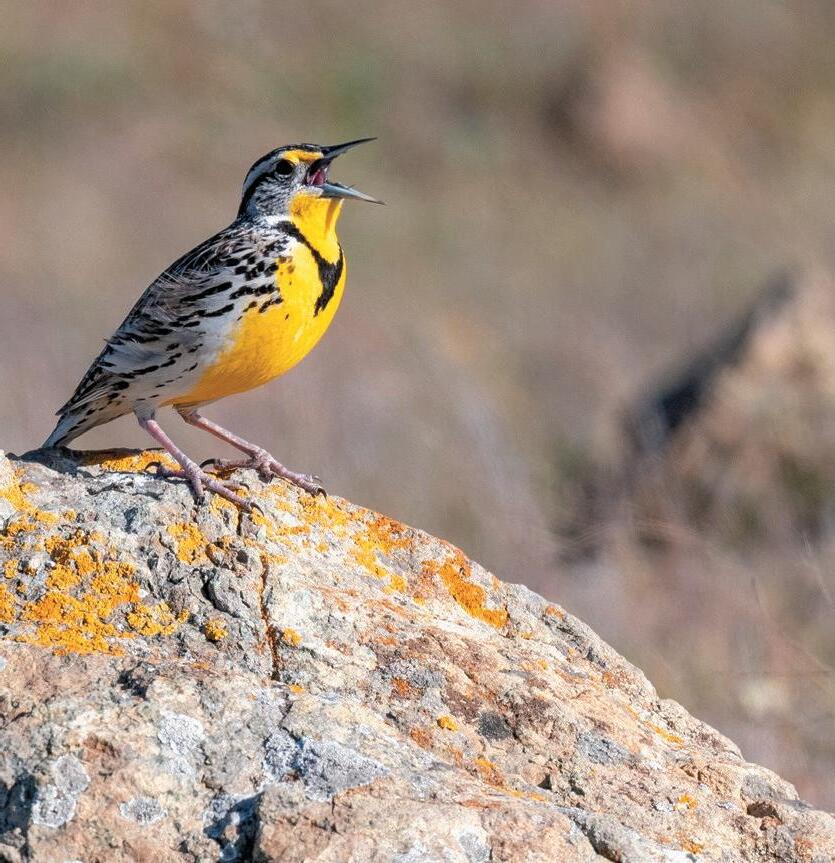
We are just getting started in 2023, and we are already making great progress:
• Achieved having the Concord City Council stop the Seeno/ Discovery Builders group from becoming Master Developer for the Concord reuse project.
• Created a stunning new public trail at our Curry Canyon Ranch, with volunteers like the Trail Dogs. The trail is about 1.25 miles long and connects Knobcone Point to Riggs Canyon.
• Moved to a better office at 201 North Civic Drive in Walnut Creek that lowered our rent and reduced our carbon footprint (with Title 24 lighting, etc.).
Thankfully, we know that together we can keep successfully advancing our land conservation mission this year.
With Gratitude,
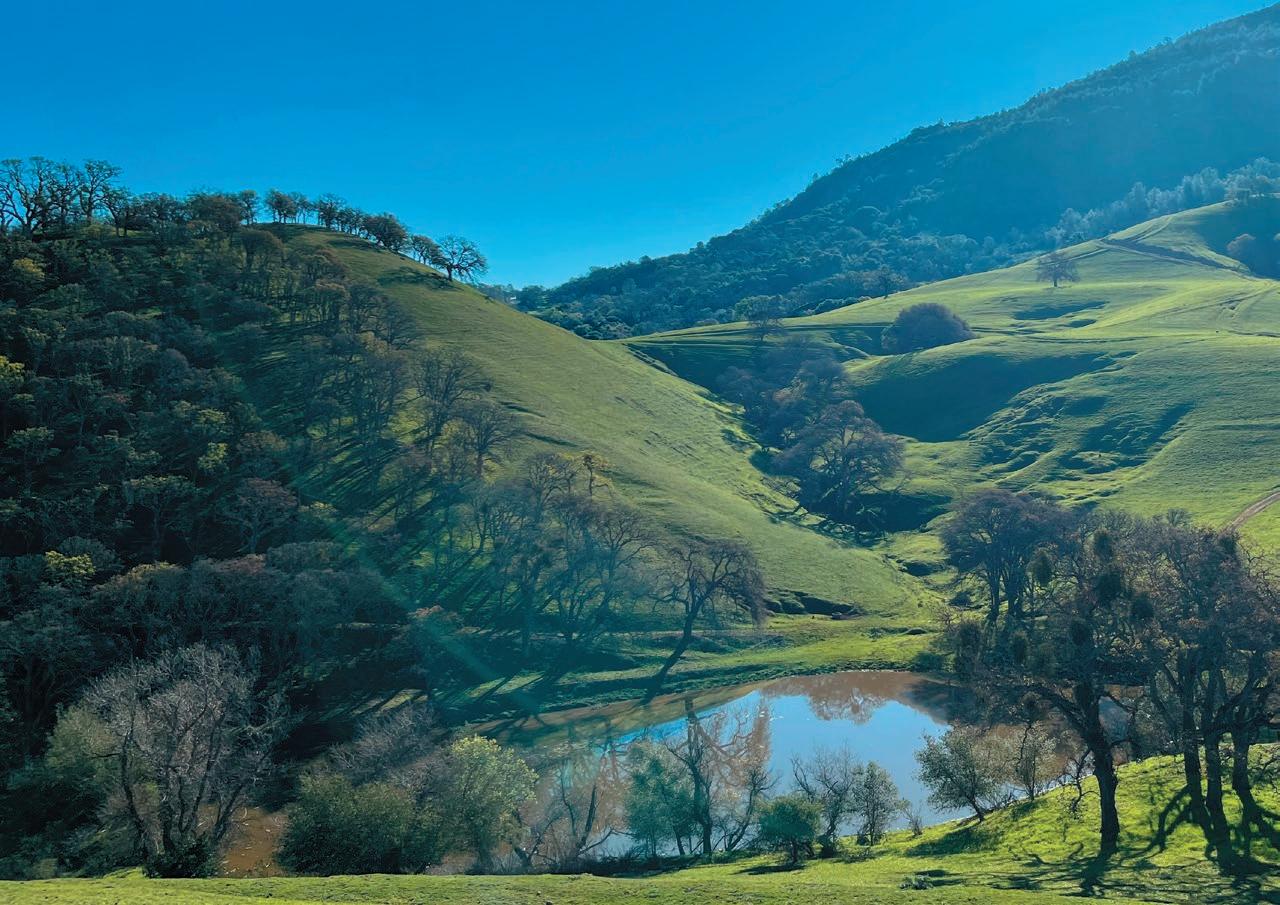
Glittering at the base of Mount Diablo’s North Peak lies Krane Pond, one of the largest water sources on Mount Diablo’s north side and Save Mount Diablo’s latest land acquisition.
AS 2022 ENDED , we secured an option agreement to purchase the Krane Pond property, a 6.69-acre section of Mount Diablo. It’s a part of the “Missing Mile,” a critical square mile of private unprotected land on the slopes of Mount Diablo’s North Peak—it’s our fourth acquisition project there.
Krane Pond has been a priority for decades, deemed important by our co-founder Dr. Mary Bowerman. It includes a large spring-fed pond that is important for wildlife, and it’s located next to Mount Diablo State Park.
Krane Pond’s ecological signifi-
cance eclipses its size; the pond itself is critically important for Mount Diablo’s wildlife. The pond could help sustain hundreds of species, from ground squirrels to mountain lions to threatened California red-legged frogs and endemic Alameda whipsnakes. When other water sources dry out, Krane Pond is a wildlife refuge, a life-sustaining water source.
Development has carved its way into Diablo’s hills, stopping at the property’s border. For decades, this land was under considerable risk of development and destruction. Krane
Pond is surrounded by different possibilities for its future. An on-site building pad, neighboring subdivision, and fragmented ranchette landscape nearby all indicate what could take place if the property isn’t protected. Had developers acquired this property, they would have graded the ridge and developed much of the acreage.
Permanently protecting this property halts development in its tracks, saving more of Mount Diablo’s open space.
In 1978, Walt and Roseann Krane purchased the land on the outskirts of Clayton that would eventually come to be known as Krane Pond.
They originally planned to build a house for themselves and their two boys on the mountainside lot, which
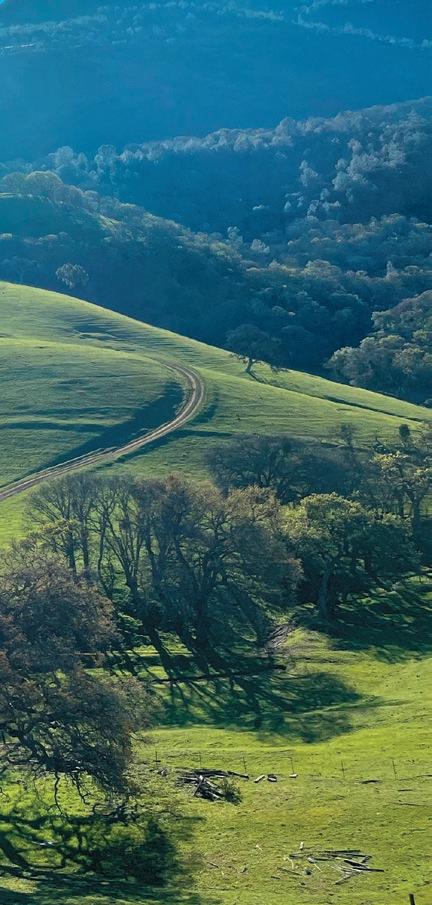
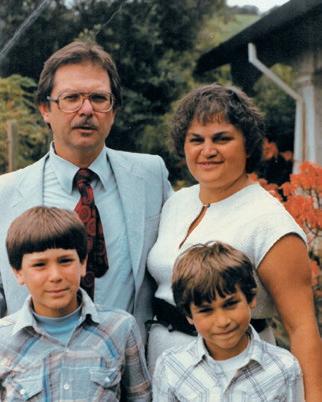
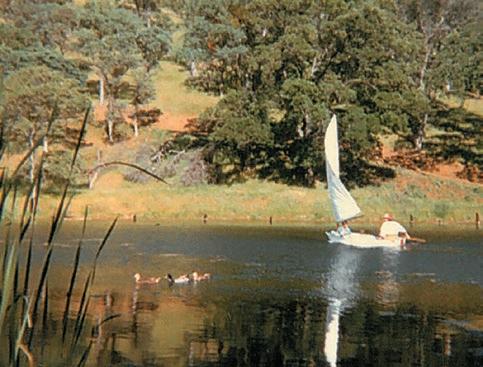
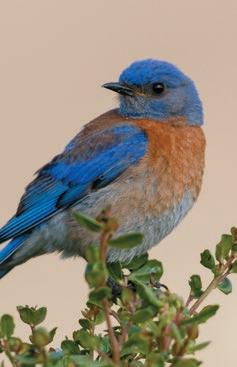

has grand views and great oaks, and a lake that was at the time 25 feet deep.
But, instead of building a house, they chose to protect the land, the water, and the animals that rely on it. The Kranes would eventually build a dock and spend years fishing, boating, picnicking, and horseback riding on the property. Over the years, they noticed a lot of Mount Diablo’s wildlife visiting the land, observing deer, songbirds, ducks, ground squirrels, rattlesnakes, and even a great blue heron. After sharing the land with Mount Diablo’s wildlife for decades, they weren’t about to let the Krane Pond property get developed.
When Walt Krane passed away, Roseann Krane chose to make sure that Krane Pond was permanently protected by selling the land to Save Mount Diablo. “I thought that the best
way to honor Walt’s memory and love of the outdoors, was having our open space preserved by Save Mount Diablo, and eventually be part of the state park system,” she said.
Beginning in 1971, our co-founder Dr. Mary Bowerman began creating acquisition priority lists based on her decades of research. Fifty years later, we have continued to follow these lists as we work to protect Mount Diablo and its surrounding open spaces.
A section of this land would eventually become known as Mount Diablo’s “Missing Mile,” a square mile made up of privately owned open space acres, some of which have not yet been secured from development. Krane Pond was one of these properties.
Over the years we’ve permanently protected more and more land within the Missing Mile. Early last year, we acquired a perpetual conservation easement on just under 154 acres of the Concord Mt. Diablo Trail Ride Association’s land. In 2015, we started a 10-year project to purchase 88.5 acres of the North Peak Ranch. And in 2006, we protected the 17.62-acre Young Canyon property.
The Krane Pond property is downstream from the Young Canyon property; the creek that empties into the pond crosses through it.
If we can raise $500,000 by October of this year—this includes two options to hold the property, the purchase price, and initial stewardship costs— then the Krane Pond property will be permanently protected. •


On March 29, 2023, Save Mount Diablo opened the Knobcone Point to Riggs Canyon trail connection in the upper reaches of Curry Canyon, a project that has been a decade in the making. Along the way, you can journey from Knobcone Point to Cave Point to Windy Point.
THIS TRAIL IS THE PIECE of the puzzle that connects the entire southern trail system stretching from Walnut Creek into Livermore, along the Knobcone Point Trail, down into Riggs Canyon and onto the Morgan Territory foothills and Highland Peak. It is a recreational dream come true—hikers, trail runners, bikers, and equestrians can now adventure further into the backcountry and experience the magnificent solitude and beauty existing deeper in the hills.
Staff and volunteers, including Save Mount Diablo’s Trail Dogs, have been busy installing infrastructure for the trail opening. We’ve put in access gates, informational signage, and kiosks as well as decontamination stations to
minimize the threat of introduced pathogens like Phytophthora species being spread by recreationalists into the further reaches of Mount Diablo State Park. Volunteers, park staff, and Save Mount Diablo staff have also been busy managing scorched material in the Knobcone Point area both in preparation for the opening as well as to minimize fire risk in the foothills. This work will bring about beautiful new growth of endemic wildflowers in the spring like Mount Diablo fairy lanterns, Mount Diablo sunflowers, and many others, as well as chaparral plants like Mount Diablo manzanitas and Contra Costa manzanitas.
Along this 1.25-mile trail, recreationalists will enjoy beautiful sand-
stone rock formations, the namesake knobcone pine forests, the most majestic bay-oak woodland in the Mount Diablo area, soaring golden eagles, songbirds, woodpeckers galore, rolling grasslands, and outrageous views of the surrounding mountains of the northern Diablo Range extending and falling all the way across the Central Valley to the mythical snow-covered Sierra Nevada, as they travel east to west or vice versa. And that’s not to mention the sensational view of the southern aspect of Mount Diablo and North Peak.
For now, only this trail is open to the public, and the surrounding hills will be preserved for wildlife to live free. This area is absolutely sublime in all meanings of the word, and Save Mount Diablo is determined to keep it that way for all to experience and enjoy its majesty.
We have been busy opening more of our lands and creating trails for the public to utilize and enjoy in the past couple of years. Last spring, we

opened the Mangini Ranch Educational Preserve in Concord, a 208-acre preserve that’s open to public groups for educational purposes via reservations on our website. There Save Mount Diablo staff, volunteers like the Trail Dogs, and numerous school groups have created just over four miles of trails for people, horses, and dogs to enjoy together. If so desired, groups can easily extend their adventures into Walnut Creek’s Lime Ridge Open Space, which is contiguous to the property.
At Save Mount Diablo, we are seriously proud, humbled, and excited to be able to share these lands that we hold so dearly to our hearts with all of you. These magical preserves are truly a gift, and to be able to spend our time connecting to them is nothing short of that. We are all so fortunate to have special places like Mount Diablo to call our backyard, and every time a new door opens to visit special areas like the Knobcone Point to Riggs Canyon connector trail or the Mangini Ranch
Educational Preserve, it makes it easy to understand that.
Please join us in enjoying these beautiful places, and take care of them as if they were your own home, because in many ways, they are.
We can’t wait to see and hear about the astonishing experiences and memories that this trail will provide.
See you on the mountain! •
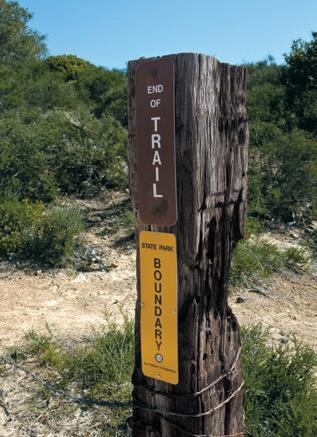
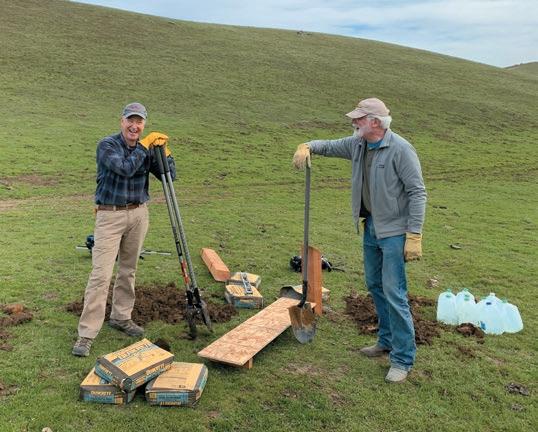
WEATHER-RELATED EVENTS have impacted the lands on and around Mount Diablo during the last decade: record-setting high temperatures, floods from massive rainstorms, months of poor air quality because of wildfires, and years of droughts. From Knobcone Point to Wall Point, these events have compounded, contributing to the death or dieback of thousands of knobcone pines and endemic Mount Diablo manzanitas.
We first started noticing this issue in the winter of 2020–2021. Immediately, Save Mount Diablo, Mount Diablo State Park, Matteo Garbelotto of UC Berkeley, and CalFire began efforts to identify the cause of the dieback. Rapid tests by CalFire showed that Phytophthora species were not affecting manzanitas, an initial concern. CalFire identified California fivespined ips (bark beetles) as the culprit affecting knobcone pines. Dr. Garbelotto tested manzanitas and
found Neofusicoccum australe, a native pathogen.
We’ve continued research to understand what else could be affecting these areas and the extent of the impact, and are beginning to formulate a management plan.
In the summer of 2021, we received a grant from the East Contra Costa County Habitat Conservation Plan. We hired two consultants to further identify the extent and cause of the dieback affecting some of the slopes of Mount Diablo, extending from Curry Canyon to Wall Point. Heath Bartosh of Nomad Ecology piloted numerous drone expeditions, photographing the areas, identifying affected populations, and creating a high-resolution map of areas in need of focus. Ted Swiecki of Phytosphere Research took soil samples and tested for introduced pathogens. No introduced Phytophthora species were detected—excellent news because our plans for opening
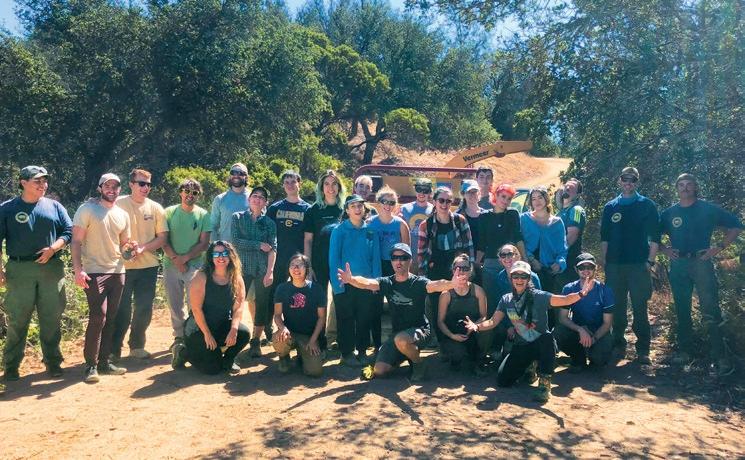 By Sean Burke
By Sean Burke
the connector trail along Knobcone Point, through upper Curry Canyon, and into Riggs Canyon depended largely on this finding. We didn’t want to open a contaminated area to the public, and potentially spread soil, water, and airborne pathogens.
Since this finding, Save Mount Diablo and Mount Diablo State Park staff have been working together with CalFire to create and implement a management plan to thin dead shrubs and trees along roadways in heavily affected areas. Save Mount Diablo has organized and hosted two volunteer cleanup events so far. We’ve empowered more than 50 volunteers from the Trail Dogs, Yosemite Climbers Association, Bay Area Climbers Coalition, and UC Berkeley to become involved. We’ve reduced potential fuel loads and created space for new growth and wildlife, particularly Mount Diablo fairy lanterns, Mount Diablo sunflowers, Mount Diablo manzanitas, and Alameda whipsnakes.
Save Mount Diablo, state park, and CalFire staff are actively working to thin affected material, trap bark beetles (Ips paraconfusus), and reduce slash and dead material that the insects colonize. We’re working together with volunteers to reduce fuel loads and fire danger.
This massive project is all about teamwork. We are planning future workdays with state park staff to provide much-needed support. The mountain needs all of us as climate change continues to throw us curveballs. Now is the time to become involved and give back to the places that we love, enjoy, and call home. •

IN FEBRUARY, the East Bay Regional Park District was granted $7 million from the California Coastal Conservancy for the purchase of the $11.4 million 768-acre Finley Road Ranch property. This grant completes the funding for the property, which will close escrow in April.
The property is one of the two most important missing staging areas for Mount Diablo and a top five priority for Save Mount Diablo. In September, Save Mount Diablo donated $50,000 to the East Bay Regional Park District as 25 percent of the $200,000 option payment to secure the initial option agreement for Finley Road Ranch and hold it while fundraising was taking place.
The property is located at the mouth of Riggs Canyon off Finley Road at the western edge of Morgan Territory Regional Preserve and the southern edge of Mount Diablo State Park.
“We have partnered with the Park District, Mount Diablo State Park, and the Coastal Conservancy for decades to create the Mount Diablo to Morgan Territory wildlife and recreation corri-
dor,” said Ted Clement, Save Mount Diablo’s Executive Director. “This property will open up Riggs Canyon and make many miles of trails and thousands of acres easily accessible so that the public can better connect with nature.”
The $7 million grant for acquisition of Finley Ranch Road property was one of 12 grants recently announced by the California Coastal Conservancy to advance restoration, protection, public access, and climate resilience along the California coast and San Francisco Bay.
“We very much appreciate the California Coastal Conservancy for its leadership in preserving natural lands and shorelines throughout the state and providing this critical funding,” said Park District General Manager Sabrina Landreth. “We thank the state, our partners, and staff for their contribution toward the acquisition that supports our mission and the state’s 30x30 goals to conserve nature for future generations.”
The East Bay Regional Park District was also recently awarded a $300,000
grant from the California State Parks Habitat Conservation Fund for acquisition of the property.
The Finley Road Ranch property includes a flat, accessible area that provides the opportunity for a staging area at the entrance to Riggs Canyon, which would significantly improve public access to the property, Morgan Territory Regional Preserve, and adjacent Mount Diablo State Park. •
ABOVE: View of Riggs Canyon and Morgan Territory. The purchase of Finley Road Ranch will mean a staging area can be created so people can better access these areas.
BELOW: Pacific houndstongue (Cynoglossum grande) has been spotted on the Finley Road Ranch property.
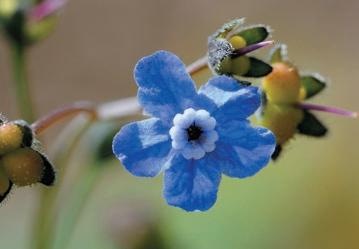
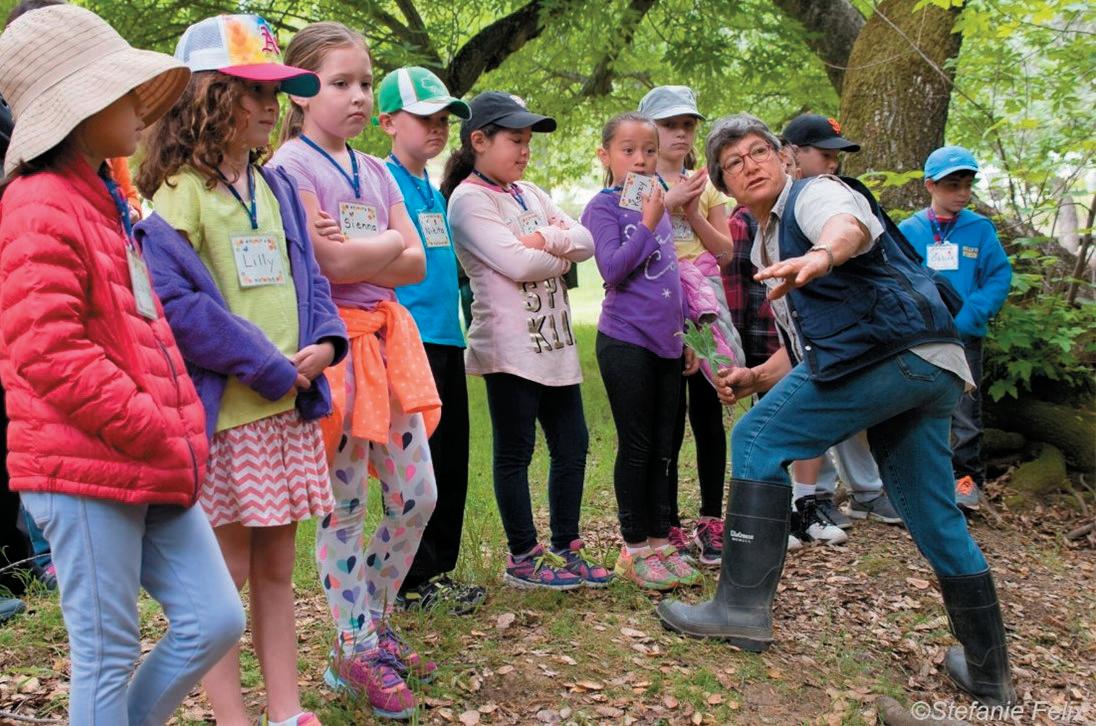
IN JANUARY, Save Mount Diablo announced its new Adler Education Fund to support and expand Save Mount Diablo’s education programs. The purpose of the fund is to inspire a love of nature through education and to help connect our land trust with area schools to foster eco-literacy and enlightened stewardship in California.
The Adler Education Fund was initiated by a generous $100,000 challenge grant from Judy Adler, a locally renowned environmental educator and long-time Save Mount Diablo supporter. She hopes her leadership gift will energize and inspire additional gifts and grants to support Save Mount Diablo’s educational programs.
New initiatives made possible by the Adler Education Fund will be guided by an advisory committee. The committee consists of local educators and dedicated Save Mount Diablo supporters. The group has decades
of combined experience teaching students of all ages in classrooms and in natural settings.
An initial goal of the Adler Education Fund is to expand Save Mount Diablo’s educational offerings for students in grades three through five. Mangini Ranch Educational Preserve will be the center of our expanded educational programs.
The preserve is a 208-acre parcel that Save Mount Diablo acquired in 2007 and opened to the public in 2022. Use of the preserve is available by reservation, and free of charge, to groups pursuing educational activities. Reservations can be made online through Save Mount Diablo’s website.
The preserve offers more than four miles of trails, and showcases many habitats, including grasslands, stream corridors, oak woodlands, and chaparral. The setting is rich with ecological examples and hands-on teaching
tools—it is an extraordinary place for students to learn about nature, in nature.
Work is already underway to develop new nature-centered lesson plans for third through fifth grade students that can be used during field trips to Mangini Ranch Educational Preserve. This outdoor learning curriculum will be aligned with Next Generation Science Standards (NGSS), California History and Social Science Framework, Common Core state standards, and other leading principles of environmental education.
The lesson plans will incorporate concepts from biology, ecology, geography, and social science. During their field trip, students will have the opportunity to explore the preserve and to observe how the lesson is physically represented in their surrounding natural environment. The lesson plans will specifically address relevant standards
for grades three, four, and five and will be tailored to each grade level.
The field trip lesson plans will also incorporate the use of box stops, or learning stations, that will be strategically located on the preserve. Each stop will have a companion box that contains a curated set of materials that teachers can use to demonstrate a concept that is evident at that particular location. These box stops might be located near a notable tree, at a restoration site, near a dramatic land feature, or in the proximity of an animal habitat.
Over the coming year, a pilot program to test and perfect the curriculum and field trip format will be conducted with student groups from local schools. In the future, the curriculum will be available on our website as an example and model to support teachers, land trusts, and other environmental educators.
Work is also underway to design a permanent educational pavilion at the preserve so that visitors have a defined, sheltered space to reflect on their experience. By offering shelter from the elements, the pavilion will make it
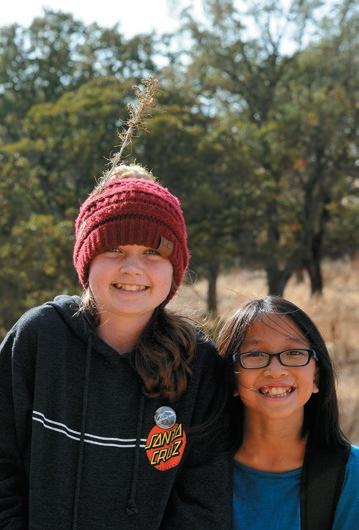
Renderings of our educational pavilion are still being perfected and likely to change.
possible for students and other groups to comfortably experience the preserve in all seasons. Construction of the shelter is expected to be complete by March 2024. We are extremely grateful to Colin Alley of BCV Architecture and Interiors and Jeff Stone of Diamond Construction for designing and constructing the pavilion!
Through its existing educational programs, and by expanding them to include elementary school students, Save Mount Diablo is providing new
and valuable opportunities for people of all ages to deepen their connection to nature. Connecting and inspiring people in nature can be a powerful and impactful conservation tool—we are most inspired to protect nature if we are deeply connected to it.
We are excited to offer more outdoor learning opportunities to a larger, diversified group of students in our communities and we look forward to learning in nature with these future leaders. •
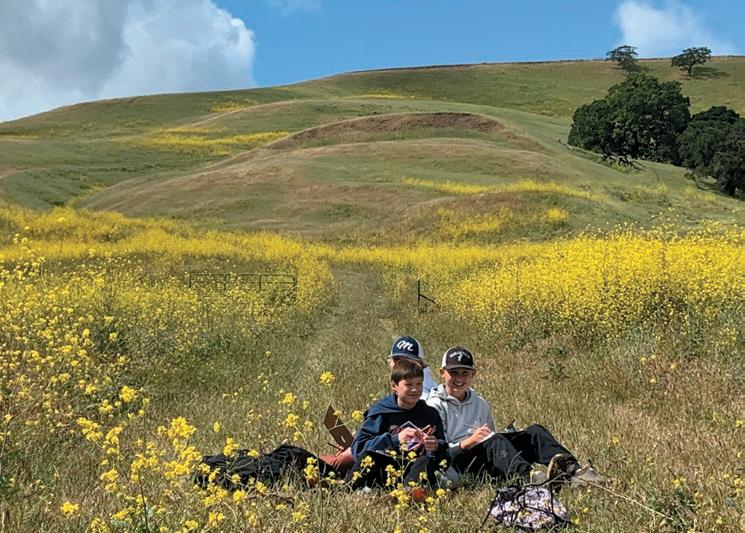
OVER THE LAST TWO YEARS, our volunteers have worked hard to plant a huge assortment of oaks, grasses, and other native plants for our 10,000 Trees and Plants project. Part of our Climate Action Plan, this project addresses the climate crisis and habitat loss by planting and protecting 10,000 native trees and plants to sequester carbon and provide healthy habitat for local wildlife.
Last December, we planted our 2,000th plant, marking the completion of one fifth of our goal! Our team planted purple needlegrass (Stipa pulchra), California’s state grass, at our Marsh Creek 4 property in Clayton. Purple needlegrass is drought- and heat-tolerant, can grow in poor soil with deep roots, and burns slowly. It also suppresses invasive plant species and supports native oaks.
Native bunchgrasses are vital in creating healthy native ecosystems. They have roots that go deep underground, sequestering considerably more carbon than one would think looking at them from above.
This year, we’ve also been working to plant California milkweeds ( Asclepias californica) on our lands. Milkweeds are host plants for monarch butterflies. In 2022, migratory monarch butterflies were officially declared endangered.
But California milkweed is just one of many species that we’re planting on these lands. A variety of native plants is important for sustaining a variety of native animals. Among the most
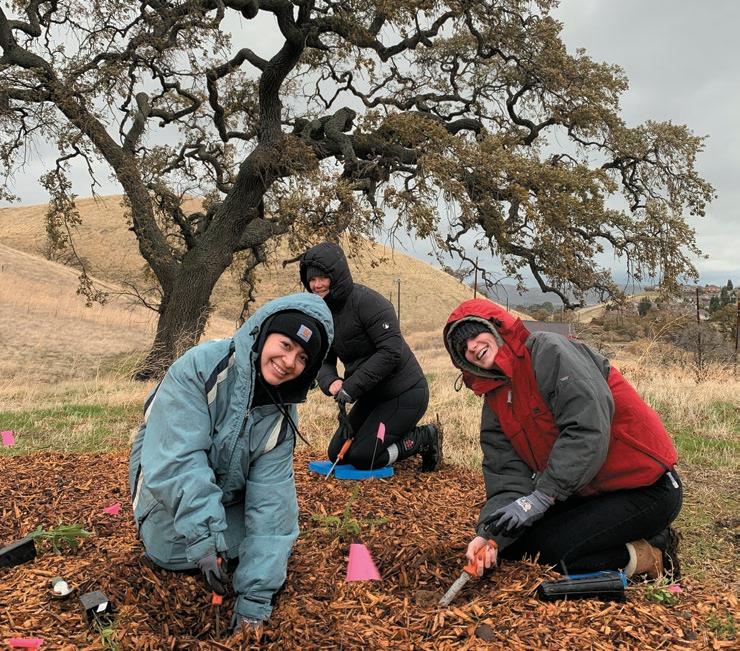
recently planted species on our properties are California aster (Symphyotichum chilense), yarrow ( Achillea millefolium), and purple needlegrass (Stipa pulchra). But visitors who look closely can also find plants like white sage (Salvia apiana) and soap plant (Chlorogalum pomeridianum).
This year we added plants to two additional properties, Wright Canyon and Mangini Ranch Educational Preserve. In the winter, our Diablo Restoration Team volunteers particularly focused on Mangini Preserve— they planted native plants near the trailheads. Visitors can spot these assorted species as they start their journeys through the preserve.
Volunteers also added plants along the perimeter fencing at Wright Canyon to expand habitat and attract pollinators to the property. And they sowed native flower seeds and began protecting trees along trails in the upper area of the property. In a few months, there will be pops of color from blooms across many Save Mount Diablo lands.
Since planting these trees and plants, our volunteers have been caring
for them by watering regularly in the dry season, removing invasive weeds, and installing tree tubes to protect our native tree seedlings.
Two thousand is no small number, and the only way we’ve been able to accomplish this much is with the support of our community. Between our Diablo Restoration Team; our watering crews; and school, camp, and corporate groups, about 200 volunteers joined us across 30 workdays in 2022!
We want to thank the groups from Riverview Garden Academy, The Athenian School, Temple Isaiah, AssetMark, DocuSign, and Omron for their partnership and hands-on contributions to our projects. •
 By Mary Nagle
By Mary Nagle
, the California condor (because of its 10-foot wingspan) can fly hundreds of miles in a day—even the length of the entire Diablo Range.
Before it was driven nearly extinct by lead poisoning, egg poaching, deforestation, and other hazards, the California condor had a historical range that stretched not just throughout California, but to Florida, northern Mexico, and western Canada.
We’ve been supporting research on the California condor’s recovery as its population and range re-expands.
In January, we approved a $9,396 grant to the Pinnacles Condor Recovery Program at Pinnacles National Park, to fully fund nine long-range GPS trackers for young condors. These young birds will soon be establishing their own territories, potentially nesting in new locations. It’s possible that the Mount Diablo area could be one of them.
In 2021, Condor 828 crossed the skies from Pinnacles National Park, visiting Mount Diablo. It was the first California condor to visit Contra Costa County in over a century. In mid-2022, a second condor, Condor 943, visited the Mount Diablo region, soaring over Brushy Peak Regional Preserve near Livermore before returning to Pinnacles National Park. This news was a big deal; it was a historic conservation victory. The California condor is back.
Will condors begin to nest closer to Mount Diablo?
Given the California condors’ ability to fly such long distances, specific GPS trackers are needed to fully track their movements and understand their current range. Collaborations like these help everyone see and understand the success and effort involved in endangered species repopulation efforts.
Last year, Save Mount Diablo previously helped to fund nine long-range GPS trackers for young condors. The findings were extraordinary. The flight paths of the young condors were tracked throughout the Diablo Range, illustrating the steady expansion of the condors’ range as the young condors explored new territory.
In 2023, more condors will fly far and wide in search of their own territories. If the condor recovery continues successfully, we can hope that a condor pair will choose to nest and raise their young closer to Mount Diablo. If they do, they will be the first nesting pair of condors in this region in over a century.
Even more likely: these GPS trackers will show that the condors are increasingly flying the length of the Diablo Range, demonstrating how important the range is as a significant wildlife corridor with intact connectivity and rich biotic features.
We’ll follow along as the condors’ range expands with the hope that one day we’ll be as likely to see condors flying overhead as we are golden eagles. •
RIVERS
flowed over California this past winter, turning the dry clay landscapes of the East Bay into a moldable force, carving the land with new drainages, and sloughing off landslides everywhere. When severe storms pass through, time and financial capacity to respond are crucial to protecting infrastructure and access. Having a robust Stewardship Endowment Fund greatly expands our options for responding to emergencies.
Along our Marsh Creek properties, we depend on crossings to access our lands, and in these storms, the power of the creeks is extremely strong, reminding us that we can lose access at any time. Marsh Creek overwhelmed the crossing into our Marsh Creek 4 and 6 properties, leaving us briefly without access. Staff worked with neighbors at Marsh Creek 6 and installed hay bales along the shared, steep driveway to help reduce mudslides into the creek.
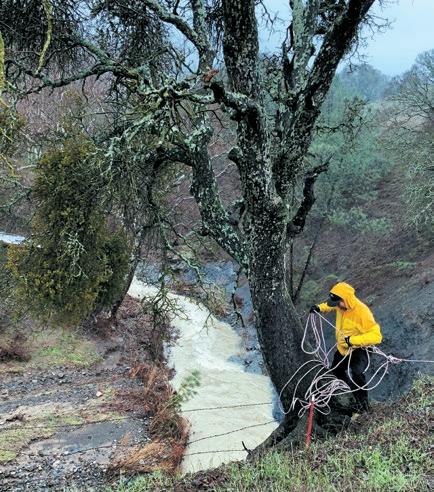
Meanwhile, downstream at Save Mount Diablo’s Big Bend property, the power of the creek demolished our footbridge for the second time in six years. The previous bridge was replaced by volunteers after the 2016–2017 storms destroyed it. This bridge is the only access from the eastern floodplain to the house floodplain when the creek is flowing.
Anderson Ranch has suffered major impacts on internal fire roads where drainage has carved chasms as storm runoff found its way into the creek. Staff worked between storms to dig several trenches to reduce and redirect flow that had already caused a decent-sized mudslide into the creek.
The earthen dam at Wright Canyon held strong, with excess water overflowing into the spillway. Staff cleared a few clogged arteries beyond the pond, where the spillway had numerous blockages, to protect several buildings, including the house where our caretakers reside.
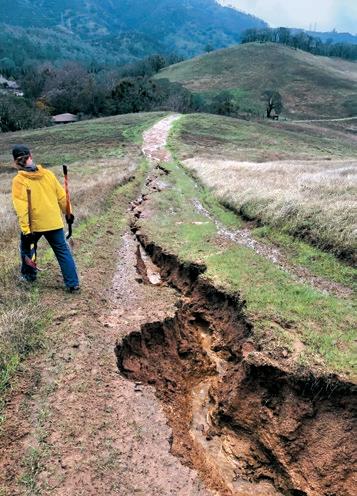
Curry Canyon Ranch felt the power of Curry Creek, with inlet streams moving lots of earth into drainages and creating landslides that blocked vehicles on state park fire roads. We dug several diversion trenches and fortified them with sandbags and rock. Several trees had fallen, blocking fire roads, so we cut and cleared them. At the lower 200 acres of our Curry Canyon Ranch, our main fire road washed out, which means we may lose vehicular access to this part of the property permanently. The landslide that obliterated a pond in the 2016–2017 storms slid further into the main fire road as well.
As severe storms occur more frequently, we are seeing repeat issues like losing the footbridge at Big Bend, while others are compounding in damage like the Lower 200 slide.
How we address future issues will depend on how we prepare now.
You can help by contributing to our Stewardship Endowment Fund to provide more options to respond during emergencies. To date, we have secured $2,768,109 toward our initial goal of $3 million for our Stewardship Endowment Fund. •
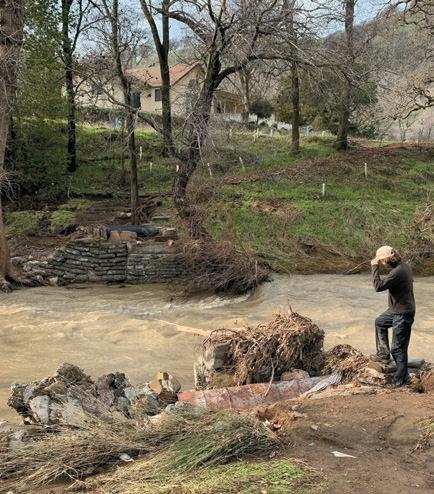
The concept of providing more water for waterintensive agriculture in a semi-desert area during a mega-drought deserves a major rethink.
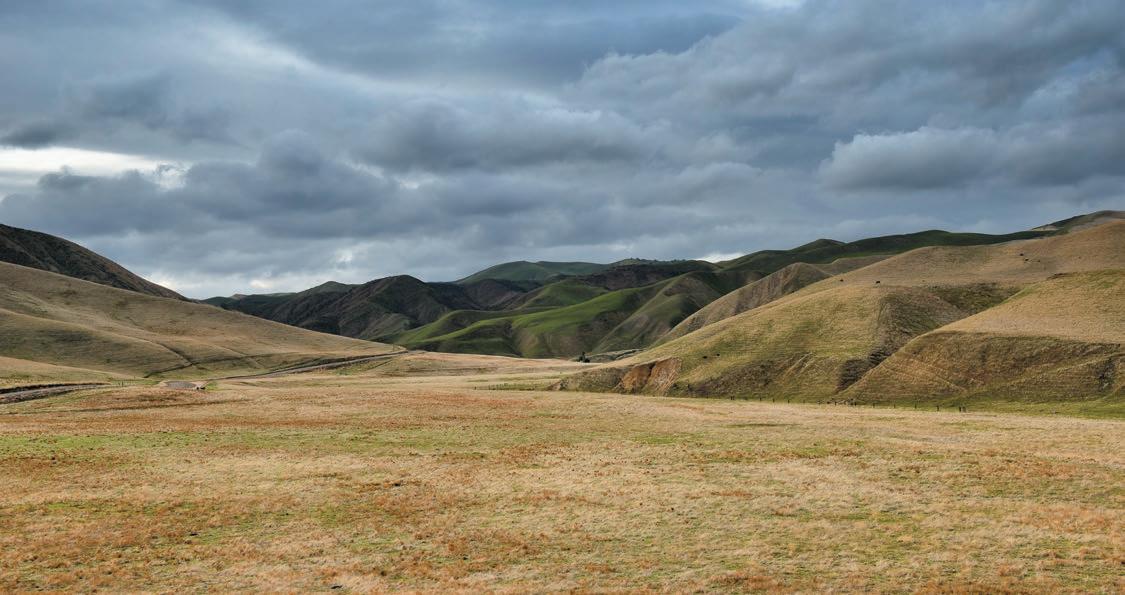
When it comes to water in California, damming rivers and creating reservoirs has been the favored approach for a long time.
THOSE AT THE FOREFRONT of the water management, land stewardship, and climate crisis fields say that rethinking agriculture in the neardesert parts of the state, reforming groundwater use, underground storage and comprehensive monitoring, conservation, and efficiency reforms are all parts of the solution to living in a hotter, drier, more extreme weather future (and present). Making more reservoirs may not be the solution many think it is.
In Contra Costa County, planning is underway on the second expansion of Los Vaqueros Reservoir. When the reservoir was first completed in 1998, Save Mount Diablo was instrumental in negotiating a tradeoff with the Contra Costa Water District (CCWD): flooding of a valley in exchange for tens of thousands of acres of habitat protection around it.
When the reservoir was expanded to its current capacity of 160 thousand acre-feet in 2012, land that was already supposed to be protected when Los Vaqueros was constructed was drowned. We therefore sought a very
high mitigation ratio, and as a result, 6,000 new acres were protected in addition to the original 18,500-acre watershed.
We and CCWD are making good progress on guaranteeing even more protected land for mitigation for this second expansion. We don’t like to see land that’s already protected being impacted, but if it happens, we’re going to make sure it leads to protection of a much greater amount of land than is impacted.
In beautiful Del Puerto Canyon in Stanislaus County, we helped a coalition of groups challenge the approval of the Del Puerto Canyon Reservoir, and we won! The courts agreed that the environmental review for this proposed 800-acre, 82-thousandacre-feet project was inadequate, and ordered that the project’s approvals be canceled. The Del Puerto Water District could come back for another approval, but we and our partners are ready. The water district wants this reservoir to irrigate agriculture in the Central Valley, but again, the concept of providing more water for water-in-

tensive agriculture in a semi-desert area during a mega-drought deserves a major rethink.
Finally, the proposed Pacheco Reservoir expansion in Santa Clara County near Pacheco Pass would flood part of Henry W. Coe State Park, and has skyrocketed in cost from an initial $800 million to now more than $2.5 billion. We’re part of a coalition that filed a legal challenge when the Valley Water District refused to do geotechnical analyses to determine if the project is safe and its effects on the land. An outrageous price tag, impacts to a state park, and a proposal to flood more land rather than increase water recycling or investigate groundwater storage are good reasons why the Pacheco Reservoir should not be expanded.
We will continue our work with partners to increase land protection, demand thorough environmental review, and encourage bold ideas and practices that shift water policy to meet the challenges of the climate crisis. •
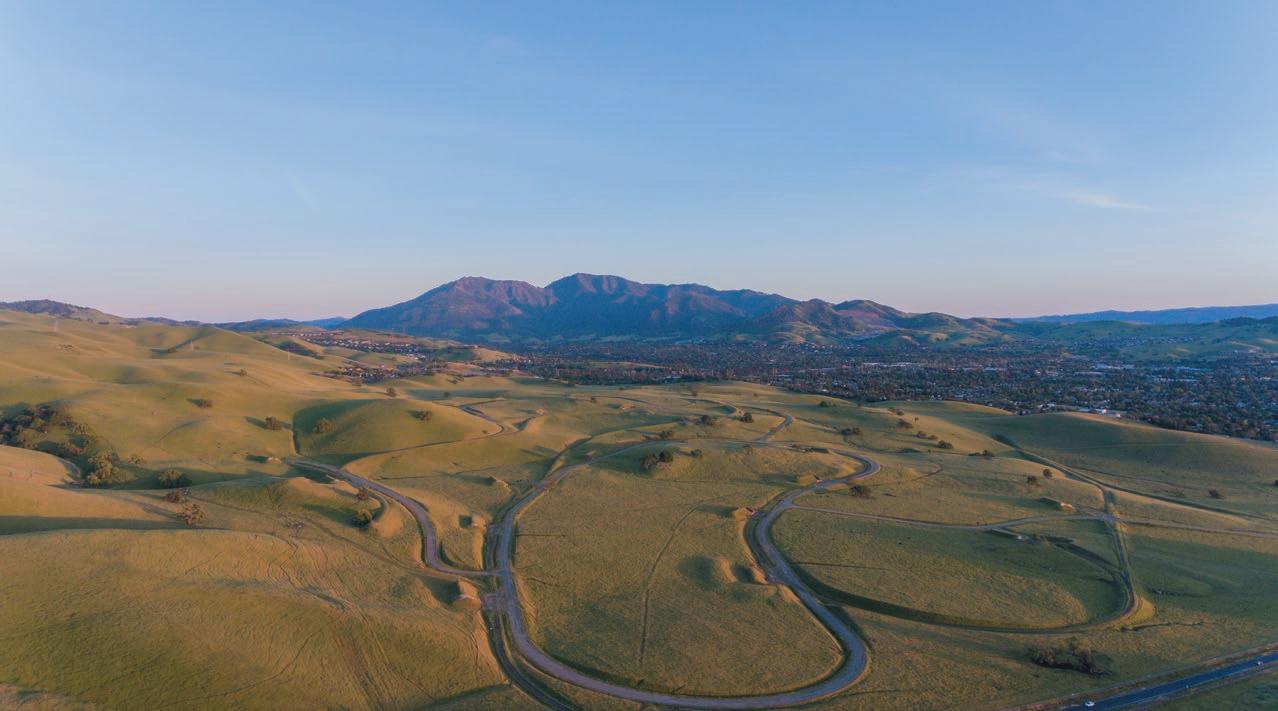
ON JANUARY 28, Mayor Laura Hoffmeister and Councilmembers Laura Nakamura and Carlyn Obringer voted to let the Exclusive Negotiating Agreement with Seeno and their partners that the City of Concord had for the huge Concord reuse project expire.
Dropping Seeno was the culmination of a year and a half of work, and helps ensure that this project will be a benefit to the community rather than a disaster.
In August 2021, the then–Concord City Council voted three to two to enter into exclusive negotiations with Seeno and their partners to be Master Developer. Then-Mayor Tim McGallian, then–Vice Mayor Dominic Aliano, and Councilmember Edi Birsan voted to make Seeno and their partners Master Developer, with Councilmembers Carlyn Obringer and Laura Hoffmeister dissenting. McGallian lost his re-election bid in November last year to now-Councilmember Laura Nakamura.
Seeno’s term sheet proposed nearly 4,000 more houses (about 16,000 total) than what was previously agreed for
the project back in 2012. It also offered less park and green space than what had been promised to residents. And it proposed an unworkable arrangement to meet affordable housing requirements, among other serious shortcomings.
To inform Concord residents and get our message across to the Concord City Council, we continued our bimonthly email updates to residents, distributed flyers all over Concord, published a mailer that went to the whole city, and highlighted the excellent reporting of the East Bay Times when it revealed that members of the Seeno family were suing each other over a number of disputes.
This information, which should have been disclosed to the public, city staff, and officials, revealed debt crises, allegations of bullying, and serious questions about whether Seeno and their partners were financially capable of delivering any of the reuse project’s great promise. All this added to the lengthy and well-documented history of controversy, scandal, and legal trouble the Seenos are well known for.
The City of Concord will now
search for a new Master Developer. Even though a majority of the Council gave Seeno and their partners the boot, despite everything, Vice Mayor Edi Birsan and Councilmember Dominic Aliano still wanted to stand with Seeno.
Thanks again to Mayor Laura Hoffmeister, Councilmember Laura Nakamura, and Councilmember Carlyn Obringer for their time, effort, and good decision.
Save Mount Diablo has been involved with the Concord reuse project since 2005. We joined with other stakeholders to advocate for good jobs, affordable housing, parks, and walkable climate-friendly neighborhoods that capitalize on mass transit. As a result, when the city adopted the Area Reuse Plan in 2012, more than 3,500 acres of land were designated as parks, greenways, and open space. Much of that—about 2,700 acres—has taken the form of the new Thurgood Marshall Regional Park.
We will continue to work with all parties to defend public benefits and ensure that this project enhances the region. •
IF YOU SPEND TIME HIKING with Save Mount Diablo, you will surely encounter the warm smiles and capable leadership of Carolyn and Steve Balling.
For years, Steve and Carolyn have regularly led Discover Diablo hikes, offered a training hike series to Four Days Diablo participants, and volunteered their support during Four Days Diablo. Their boundless enthusiasm, extensive hiking experience, and skillful observations as certified California Naturalists have benefitted dozens of participants.
When Steve and Carolyn reflect on their long history as hike leaders and Moonlight on the Mountain volunteers, Carolyn explains, “we do the ‘enjoy’ part of Save Mount Diablo’s mission—it’s what we get excited about.”
Carolyn came to know Mount Diablo closely as the head coach for the Leukemia & Lymphoma Society’s Team in Training hiking and marathon walking programs. Mount Diablo was her perfect place to lead challenging training hikes.
The personal connection to Mount Diablo is a deeply rooted one for Steve, who grew up in “the shadow of the mountain” in Walnut Creek. He spent childhood days exploring natural lands around Shell Ridge, and then witnessed the steady increase of local

development in the years that followed.
Steve learned about Save Mount Diablo’s mission, and its decades of conservation success, through an invitation to one of our first Moonlight on the Mountains. His and Carolyn’s involvement with Save Mount Diablo quickly grew, and they soon transitioned to very active volunteer roles. Their commitment is motivated by “the remarkable achievement” that is apparent by the undeveloped slopes of Mount Diablo, a place that plays a meaningful role in their everyday lives.
Since Save Mount Diablo expanded its activities into the Diablo Range, Steve and Carolyn are even more excited about the potential for impactful conservation efforts in the future.
“It’s an incredible opportunity to educate about the whole Diablo Range corridor, its ecosystems, and biodiversity,” says Steve.
This long-term vision, and commitment to the future of protected land in
the Diablo region, explains why Steve and Carolyn joined the Diablo Legacy Circle by including a gift to support Save Mount Diablo in their estate plan. “Land conservation is a lifetime’s work, and an organization has to be ready for the long-term. We want our gifts to go to things we believe in.”
Thanks to their thoughtful planning, Steve and Carolyn Balling are helping to ensure that Save Mount Diablo’s work to preserve, defend, restore, educate, and enjoy the treasures of Diablo’s natural lands can continue long into the future.
For more information about how to support Save Mount Diablo in your philanthropy plans, please contact Samantha Kading at 925-949-4513 or skading@savemountdiablo.org. •

TRIBUTE GIFTS and donations made in honor of or in memory of loved ones between July 1 to December 31, 2022 are listed below. Thank you to all of our supporters. Your generosity preserves, defends, and restores the mountain for all of us to enjoy!
Tribute names are indicated in bold. An asterisk (*) denotes donors who make monthly tribute gifts.

Jim Alton
Christine Brighton
Gretchen & William Anderson
Kathleen Glasman
Tyler Austen
Tracy Mitchell-Ashley
Eric Bain
John Bain
Carol Baxter
Vernon Koehler
David Birka-White
Karen Kubin
Ralph Bleier
Zoe Goldblatt
Blue-Eyed Grass Band
Stan & Jennifer Roe
Boonsuay Clement
Ted Clement
Tom DeJonghe
James Marchetti
Gail Delalla
Paul & Carol Long
Dave Dornsife
Karen Ambrogi
Marcia & Greg Eiler
Carol Gegner
Sue Elvidge
Carly Owens
Jim Felton
Les & Anne Wallerstein
Mark Friedman
Zoe Goldblatt
Brian Gagnon
Moira McCabe
Nancy Gallagher
Tena & John Gallagher
David Graff
Lou Dagen
Gretchen
Jim Murphy
Jack Harper
Donna Harper
Brad Heckman
Patrick Graney
Claudia & Scott Hein
Darlene Hecomovich
Michael & Jane Larkin
Sharon Walters
Michael Hill
Barbara & Robert Hill
Beth Johnke
Donna & Mark Johnke
Al Johnson
Carol Johnson
Beverly Ann Johnson
Darryl Johnson
Samantha Kading
Francine Austin
Dylan & Rachel Kruse
Margaret Kruse
Erin Kruse
Margaret Kruse
Margaret Kruse
Sandra Woliver
The Kunnes Family
Mia Monroe
Edmund Weston
Lu
Noah Simcoff
Christina Madlener
Alana McBrayer
Bunny Martin
Alana McBrayer
Michael McClaskey
Gigi McClaskey
Carlene McNerny Abbors
Stephen Abbors
Nonni Monteverdi
Brent & Christiane Brinkerhoff
David Ogden
Patrick Graney
Greg Orr
Carol Addison
Rob & Suzie Ostheimer
Peggy Nieder
Nancy Patton Cosden
Bill Cosden
Peregrine Team, MDIA.org
Anastasia & Randall Hobbet
Pam Ramos
Delores Mullican
Judith Redstreake
Vivian Boyd
Bronwyn & Dominick Regan
George & Nete Hsieh
Marian & Lewis Reynolds
Sue Reynolds
Howard Russell
Jennifer Russell
Alan C. Shelton
Rebecca Shelton
Robert B. Shuey
David & Shelly Shuey
Malcolm Sproul
Allan & Kit Prager
Avery & Bella Stanco
Marsha Mather-Thrift
Gary Steele
Tracy Mitchell-Ashley
Anne Struthers
Carly Owens
David Theis
Francine Royce
Jacqueline & Paul Royce
Jeanne Thomas
Mary & Bud Lembke
Janis Tipton-King & Ed Prophet
Alexander Kwok
Ted Trambley
Sean Trambley
Ken-ichi Ueda
Akemi Ueda
Beth Wiese
Carol Oredsen
The Willen Grandchildren
Ruth & Joel Willen
Carole Woods
Steve Pate

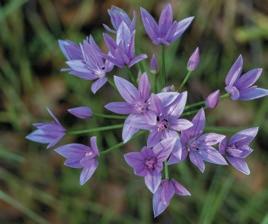
Linda M. Andersson
Bruce Fogel
Hanako O. Andrews
Paul Andrews
Brendon Armstrong
Carol & Brad Hoy
Robert Bailey
Robert & Marla Schleicher
Paul Baxter
Carol Baxter
Jonathan Bernbaum
Edwin & Diane Bernbaum
Jon Boas
Jennie Phillips
June Boswell
Lawrence & Leona Seidell
Jack J. Byrne
Julie Durand
Scott Carter
Lee Ann Carter
Robert Castiglione
Lynn Castiglione
John Cleary
Brett Stewart & Meagen Leary
Dan Coleman
Nancy & Brian Bibeau-Wright
Angelina Colombo
Michael Colombo
Dwight (Alan) Compton
Barbara Erhard
Danny Deuel
Roger & Shari Johnson
Robert (Bobby) Diamond
Steven Raymond
Mardi Duffield
Kristine Caratan
Earl & Helene Duncan
Barbara Sickenberger
Roger Epperson
Richard Davis & Sandra Jones
Norval Fairman
Mary Fairman
Anna Louise Ferri
Larry Ferri*
Steve Fielding
Sue Fielding
Connie Forslind
Sarah Ware
Maureen Fritschi
Jack Fritschi
John P. & Mary Ginochio
Frank & Barbara Strehlitz
Tridib Guha
Raymond Sullivan
Jean Hamilton
Alan Shelton
Rachel Shelton
Jean P. Hauser
Barbara Hauser
Wm. Marlow Hicks
Mary Hicks
Kenneth Hjortsvang
Steven Raymond
Hulet Hornbeck & Margaret
Hornbeck Steere
Lori Steere & Becky Smith
Martin Jansen
Mary Anna Jansen
Ayn Johnston
Kyle Johnston
Ara Kaprielian
Robert & Polly Gould
Shirley McPheeters
Jeanne Thomas
Walter Krane
Jennifer Jay & John Woodworth
Byron Lambie
Jill Lambie
Gary Luttjohann
Katherine Dano
Rebecca Mallon
Patricia Baran
Jacqueline Markham
Jill Gebhardt
John McCluhan
Joanne & Steve McCluhan
Ted McKinnon
David Katz
Peter Katz
Rollie Katz
Rose McKinnon
Dorcas & Bob Scinico
Barbara Meistrell
Joyce Fray
Michele Lasagna
Henry Moises
Louise Moises
Janet Montes
Terry & Glenn Gonzalez*
Josephine Marie Morris
Colette Cussary
Robert A. Orlando
Francis Barrett
Lee & Sophia Peregrine
Carole Mason
Jackie Pomerantz
Plant Decor, LLC
James Rease Cole
Richard Davis & Sandra Jones
Morgan Rease
Clare & Joe Scherer
Warren Rose
Anita Taff-Rice & Craig Rice
Angie Sakalay
Janet Grant
Victoria Santos
Sue Tomidy
Jim Sepic
Frank & Barbara Strehlitz
Sandy Lynn Smith
Stephen Smith
Marjorie Sproul
Malcolm & Casey Sproul
Joe Stadum
Mary Alice Stadum
Philip Stein
Andrew & Karen Stein
Harry (Chip) Stewart
Emily Barlas
Laurel Catlett-King
Mark Cederwall
Beth Dober
Rachel Goodman
Emily Johns
Suefan Johnson
Charles Klapheke
Christopher Klapheke
Dianne McVicar Orlando
People Analytics Nestle
Kristi Selby
Margaret & John Scovil
David Tredo
Neil & Lucy Watson
Clara Wellons
Allen & Kathy Westbrook
Tracy Yost
Jim Stewart
Brett Stewart & Meagen Leary
Vivian Sweigart
Terry & Glenn Gonzalez*
Howard Thomas
Judy & John Canright
James V. Thompson
Josie & John Fike
Marie Thompson
Josie & John Fike
Sally Tinsley
William Tinsley
Doris Hillery Dana Tobias
Joyce Hambrick & Loren Bauman
Susan D. Tullis
John Tullis
Dorothy Turner
Lois & Donald Olmstead
Terry Virus
Ed Grondona
Susan J. Watson
Sarah & Cary Keller
Virginia Weightman
Alma Weightman
Peter Wilson
Joyce Hawkins
Keith & Susan Horrocks
Donna & Mark Johnke
Chuck Meyer
Ronald & Barbara Winslow
Christine Winslow
Richard A. Woodman
Bruce Cameron
We have made every effort to accurately spell names. If your name or donation has not been recorded correctly or was mistakenly omitted, we offer our apologies. Please contact us so that we can amend our records by sending an email to Queenie Li, Database Coordinator, at qli@savemountdiablo.org.
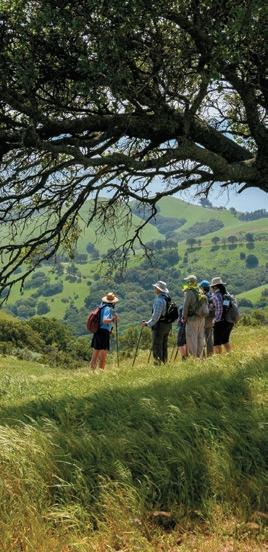
www.savemountdiablo.org

JOIN US for an unforgettable evening at our 22nd annual Moonlight on the Mountain gala!
This dramatic outdoor event transports 500 guests up the mountain’s slopes to China Wall, where they are treated to an elegant three-course meal, live music, dancing beneath the stars, and both live and silent cocktail auctions—all while surrounded by the unparalleled, majestic views Mount Diablo has to offer.
This extraordinary fundraising event supports our critical conservation programs and benefits our work to preserve, defend, restore, educate, and enjoy Diablo’s wild lands.
For more information, and to inquire about event sponsorships, please visit bit.ly/moonmtn.
“My dream is that the whole of Mount Diablo, including its foothills, will remain open space . . . that the visual and natural integrity will be sustained.”